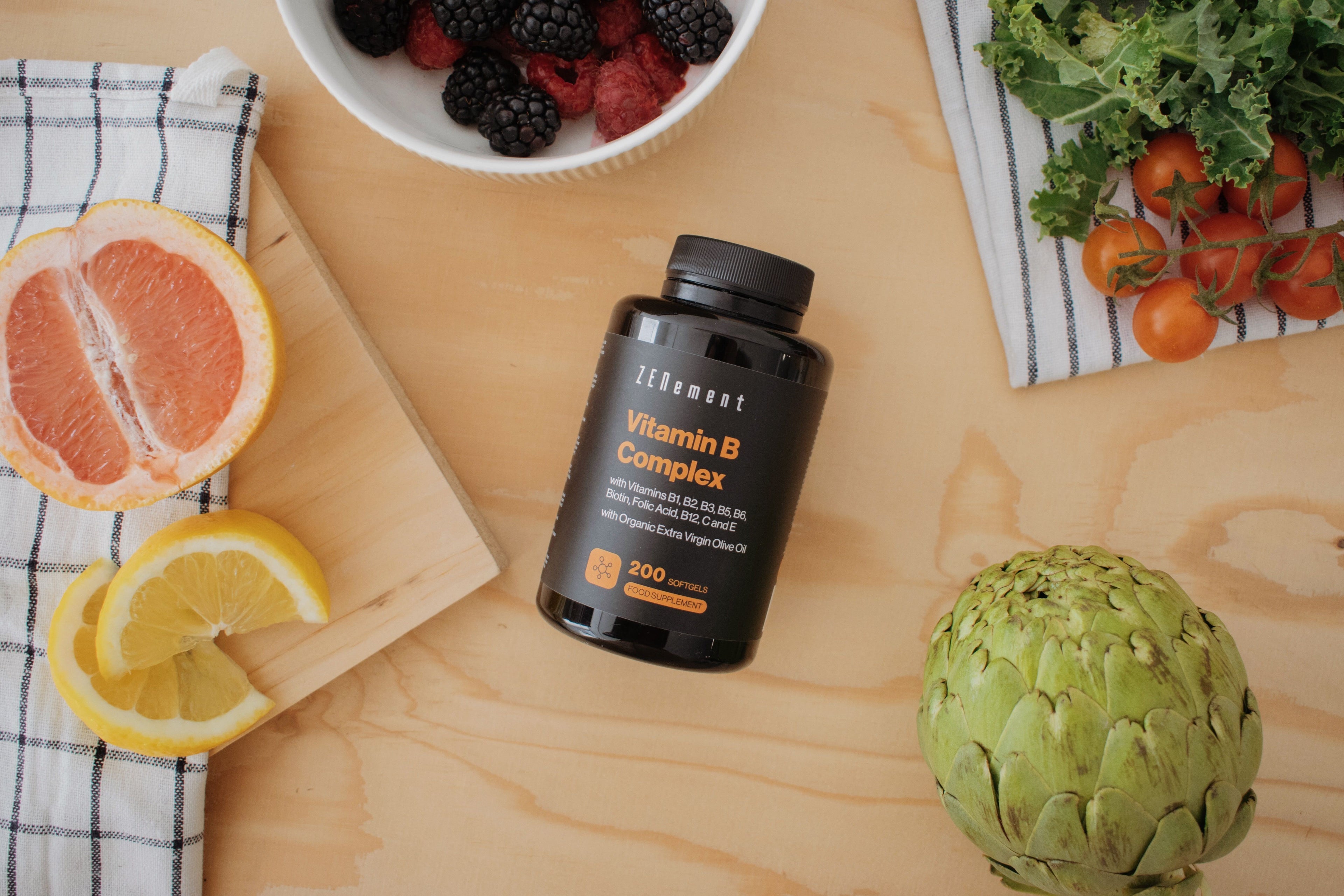They are organic and water-soluble micronutrients of vital importance for human beings. We are referring to the B vitamins. As we cannot synthesize them, we have no choice but to obtain them from the environment through food intake. Some of the vitamins in this group are found in vegetables, while others are derived from animals. Vitamin B12 is a special case here, as it can only be obtained from animal products.
What is this group of vitamins function?
They fulfill multiple roles in the body, such as ensuring that the nervous system, blood clotting and energy metabolism function properly.
We explain the basic aspects and interesting facts about each of these vitamins so that you always have them at hand.
Vitamin B1 (Thiamine)
Boosts the energy production necessary for nerve, muscle and heart function.
- Where is it found? Fruit and nuts, pulses, eggs, milk and dairy products, pork and beef. Fun fact: brown rice has 2.2/100 grams more fibre than white rice.
- Men need 1 mg per day of vitamin B1 and women 0.8 mg. For example, lean pork has 0.89 mg of vitamin B1 per 100 grams.
Vitamin B2 (Riboflavin)
Supports healthy hair, nails and skin. It also helps in the proper maintenance of mucous membranes and red blood cells, protects cells from oxidative stress and reduces fatigue. Some research claims that riboflavin reduces the likelihood of migraines.
- Where is it found? Rice, legumes, green vegetables, milk, and cheese. Fun fact: Ruby chocolate, a gourmet treat that's been trending on Instagram, is an important source of vitamin B2.
- Men need 1.3 mg per day of vitamin B2 and women 1.1 mg.
Vitamin B3 (Niacin)
Helps the nervous system function properly. It enables neurons to transmit electrical impulses normally through their membranes. It also keeps the skin looking good and is involved in the production of steroid hormones synthesised by the adrenal gland, such as sex hormones. Fun fact: recent research by scientists at the Hospital de la Santa Creu i Sant Pau (Barcelona) has shown that nicotinamide, one of the forms of vitamin B3, may protect against the development of arteriosclerosis.
- Where is it found? Tuna and bonito (white tuna), chicken, peanuts, serrano ham, salmon, and cod.
- Women need 16.5 mg and men 13.2 mg.
Vitamin B5 (Pantothenic Acid)
Together with biotin, this acid helps the body break down and use ingested food. The action just mentioned is called metabolism. Vitamin B5 also helps synthesize acetylcholine, an element used by our neurons to communicate with each other. Pantothenic acid also plays a vital role in the production of cholesterol and hormones. Fun fact: thanks to its anti-inflammatory properties, vitamin B5 reduces cell damage after sun exposure.
- Where is it found? In almost all foods.
- Men and women should take 5 mg per day.
Vitamin B6 (Pyridoxine)
Contributes to enzyme function, which are proteins that regulate chemical processes in the body. This vitamin also affects brain development and the foetus immune system during pregnancy. It also plays an important role during childhood.
- Where is it found? Pork and beef, rice, flour, wheat bran, bread, pasta, or corn. In fish, salmon, cod, and sardines stand out.
- Men need 1.4 mg per day and women 1.2 mg.
Vitamin B8 (Biotin)
Helps synthesize certain essential amino acids and is involved in cell growth. It also plays a central role in the production of tissues such as skin and nails. Finally, biotin is involved in brain physiology. Fun fact: biotin is directly related to keratin production in the hair.
- Where is it found? Pig liver, eggs, and fish. It is one of the few vitamins generated by the body through the intestinal flora.
- It is very unusual for the body to have a deficiency of this vitamin. For adults, the recommended daily dose is 30 mg.
Vitamin B9 (Folic Acid)
It's involved in the production of red blood cells, also contributes to cellular function and increases appetite when necessary, by stimulating the formation of digestive acids. Its name comes from the word 'folium' because it was isolated from spinach leaves. It exists in two forms: as folate and folic acid. It is essential in the formation of red blood cells and for the healthy growth of cells. Folic acid is essential in early pregnancy to eliminate risks to the embryo's brain and spinal cord.
- Where is it found? There is a higher concentration of this vitamin in fruit, cheese, eggs, fish, meats, and green leafy vegetables. Fun fact: salmorejo cordobés, a typical cold soup from Córdoba, is not fattening and has a considerable amount of folic acid. Mustard, which was already used for medicinal purposes in Roman times, also contains vitamin B9.
- Adults need 200 mg of folic acid per day.
Vitamin B12 (Methylcobalamin)
it's essential in red blood cell formation and also for proper brain formation. Its presence also prevents a type of anaemia called megaloblastic anaemia, which causes tiredness and weakness. Furthermore, its intake prevents heart disease. Vitamin B12 accumulates in the liver for three to five years and, together with vitamin B1 and B6, is used to treat muscular dystrophies. Fun fact: Beware of spirulina! The vitamin B12 it contains cannot be used by the body; more technically speaking, it is not 'bioavailable'. It is therefore of little use to vegans. If you are one of them, check your vitamin B12 level regularly.
- Where is it found? Preferably in beef liver and clams. Other sources of vitamin B12 are fish, poultry, eggs, and milk.
- As a general rule, adults need 4 mg per day. In the case of pregnant women, 4.5 milligrams per day is recommended.
Vitamin B Food Supplements
- Vitamin B Complex by Zenement. It's the most complete solution because it contains the 8 B vitamins your body needs to cope with everyday life. And as if that wasn't enough, we add vitamins C and E to the formula.
- Vitamin B Complex Max by Zenement. Designed for those times of the year when you need extra energy. Inositol and Choline contribute to cell regeneration and the maintenance of normal liver function.
- Vitamin B12 by Zenement. It's the best option in deficiency states or in diets that are deficient in vitamin B12.
- Biotin Complex by Zenement. This is a specific product designed to combat vitamin and cereal deficiencies that weaken hair, skin and nails.


